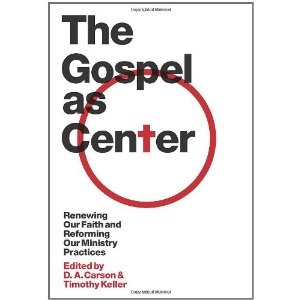 D.A. Carson (Referent auf der E21-Konferenz im Mai 2012) und Tim Keller haben gemeinsam das Buch:
D.A. Carson (Referent auf der E21-Konferenz im Mai 2012) und Tim Keller haben gemeinsam das Buch:
- D. A. Carson, Timothy Keller (Hg.): The Gospel as Center: Renewing Our Faith and Reforming Our Ministry Practices, Crossway Books, 2012, 320 S., ca. 18 Euro
herausgegeben.
Das Buch enthält folgende Aufsätze:
- “Gospel-Centered Ministry,” D. A. Carson and Timothy Keller
- “Can We Know (and Tell) the Truth?,” Richard D. Phillips
- “The Gospel and Scripture: How to Read the Bible,” Mike Bullmore
- “Creation,” Andrew M. Davis
- “Sin and the Fall,” Reddit Andrews III
- “God’s Plan,” Bryan Chapell
- “What Is the Gospel?,” Bryan Chapell
- “Christ’s Redemption, Sandy Willson
- “Justification,” Philip Graham Ryken
- “The Holy Spirit,” Kevin DeYoung
- “The Kingdom of God,” Stephen Um
- “The Church: God’s New People,” Tim Savage
- “Baptism and the Lord’s Supper,” Thabiti Anyabwile and J. Ligon Duncan
- “The Restoration of All Things,” Sam Storms
Im einleitenden Kapitel von Carson und Keller heißt es:
Over the last few years there has been a major push to abandon expository preaching for what is loosely called “narrative” preaching. The diagnosis goes something like this:
These are postmodern times, marked by the collapse of confidence in the Enlightenment project and a rational certainty about “truth.” So now hearers are more intuitive than logical; they are reached more through images and stories than through propositions and principles. They are also allergic to authoritarian declarations. We must adapt to the less rational, nonauthoritarian, narrative-hungry sensibilities of our time.
In our understanding, it is a great mistake to jettison expository preaching in this way. But in some quarters, the response goes something like this: “Because postmodern people don’t like our kind of preaching, we are going to give them more of it than ever.” They are unwilling to admit that much conventional use of the expository method has tended to be pretty abstract, quite wooden, and not related to life. It is also true that many traditional expository preachers like the “neatness” of preaching through the Epistles instead of the vivid visions and narratives of the Old Testament. But most importantly, expository preaching fails if it does not tie every text, even the most discursive, into the great story of the gospel and mission of Jesus Christ.
Das Inhaltsverzeichnis kann zusammen mit dem ersten Kapitel hier heruntergeladen werden: the-gospel-as-center-download.pdf.
VD: JT
Hört sich wirklich gut an. Vielleicht findet sich ja ein Verlag, der diesen Sammelband in deutscher Übersetzung herausbringt. Der evangelikale Markt braucht dringend evangeliumszentrierte Bücher!
Will ja nicht immer „quergrätschen“, aber ich unterstelle einfach mal, dass ihr an kontroversen Diskussionsbeiträgen Interesse habt.
Wird im Missionskontext nicht schon lange narrativ und bildhaft gepredigt (wie das ja auch Jesus tat, nur so nebenbei). Einfach weil „oral cultures“ mit systematischen, abstrakteren Lehrtexten nicht viel anfangen können. Stellen wir nicht einfach nur fest, dass sich der Westen von der „written culture“ zur „oral culture“ entwickelt? Warum sollte bei diesem Ansatz die Wahrheit auf dem Spiel stehen?
Postmoderne hin oder her…
Cool dass es das Teil auch als Kindle-Edition gibt:
http://www.amazon.de/The-Gospel-As-Center-ebook/dp/B0073VZWX4/
@Daniel
Schön, dass du “quergrätschst“ 🙂 Kann ich gut verstehen: Ich bin der Geist, der stets verneint 😉
Ich sehe wie du, dass auch in der Bibel „bildhaft“ erzählt wird, um einen Sachverhalt zu verdeutlichen. „Das Reich der Himmel ist wie ….“ Die Gefahr bei solchen Predigten ist aber, dass genau dieser Sachverhalt verloren gegangen ist. Man kommt inhaltlich über ein subjektiv empfundenes Angesprochensein nicht hinaus. Der eigentliche Sachverhalt ist weg. Solange die Bilder dazu dienen, den springenden Punkt zu verdeutlichen, habe ich absolut keine Bedenken.
Gruß
Peter
Vielen Dank, Ron, für diese Information. Das erste Kapitel ist schon mal ganz hervorragend. Neben Deinem Zitat gefällt mir (u.a.) auch der Inhalt ab S. 15 ff sehr gut. Dies beantwortet vielleicht auch manche „grundsätzliche“ Einwände mancher Christen in BRD gegen das „gesellschaftliche Engagement“. Finde ich jedenfalls sehr gut, dass die Reformierten in den USA nicht die „Emerging Church“ nur durch eine „korrekte Lehre“ bekämpfen wollen, sondern anerkennen, dass hinter manchen der Ansätze von Emerging Church durchaus auch legitime, sehr biblische Grundanliegen stehen. Zum Beispiel ist es kein Zeichen von „falscher Lehre“, wenn man ein Herz für die Armen hat – und dies auch praktisch umgesetzt wird in Barmherzigkeitsdiensten in der Gemeinde. Sehr gut finde ich auch den Aufruf, die „richtige Lehre“ zu verbinden mit Einsatz in WIRTSCHAFT, KUNST und POLITIK und anderen Bereichen. Also, das eine tun, das andere nicht lassen. All this rightly alarms many conservative Christian leaders, but some wrongly conclude that those who are strongly concerned… Weiterlesen »